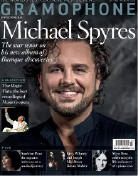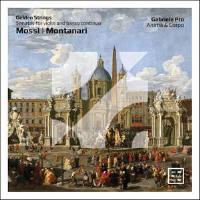Texte paru dans: / Appeared in: |
|
|
Outil de traduction |
|
|
It’s always a good sign when a recording’s first notes leap so vibrantly out of the stereo that all the day’s previous reviewing plans sail out of the window in favour of lapping up the disc in hand instead. And yes, that’s what has happened here. This is young Italian baroque violinist Gabriele Pro’s first solo recording, and his full, satiny richness and strength of tone are instantly attention-grabbing over the smoothly airborne lines opening the album’s curtain-raiser, Montanari’s D minor ‘Dresden’ Sonata. Add tightly fused, luminous support with a real depth of sound from cellist Maria Calvo, lutenist Simon Vallerotonda and harpsichordist Cristiano Gaudio, plus the warm bloom of the capturing, and it’s fair to say that Giovanni Mossi and Antonio Montanari – younger virtuoso violinist colleagues of Corelli’s in Rome, who we know played together under his direction in his 1708 performance of Handel’s La Resurrezione – have lucked out with their champions.
In fact, Pro doesn’t sound miles off the descriptions we have of Montanari’s own expressive playing courtesy of his fellow violinist-composer Giuseppe Valentini, who wrote a madrigal acclaiming him as ‘a new musical Achilles’, praising the ‘sweetness’ of his ‘golden strings’. I’ve already mentioned Pro’s ear-pricking ‘Dresden’ D minor Adagio (Dresden because, along with its two siblings, these were the three Montanari sonatas Johann Pisendel brought back to Dresden from Rome in 1717), and the other two Montanari slow first movements are no less lovely – try the E minor Largo, for instance, for the curvy beauty of his shaping and shading. Perhaps the most affecting slow movement of the disc is the Siciliana from Mossi’s Op 5 No 6 in G minor, printed in 1733, for the delicately intimate chamber dynamic from the four of them and for how Pro develops timbre, tinting, articulation and embellishment over the repeats of its melancholically lilting theme. Not all the golden strings are slow tempo, either – the Allegro moderato of Mossi’s Op 6 No 5 in E is a merry feast of double-stopping, nicely voiced bariolage and rapidly descending scalic figures sounding deliciously like pealing bells.
Essentially, the programme hammers home the point that Mossi and Montanari deserve more airtime. While the playing alone is enough of a selling point, a final boon is its library-building value: the three Mossi sonatas are premiere recordings; and not only is it the first time that all three of Montanari’s ‘Dresden’ Sonatas have been presented together on disc, it’s also the first time that the A minor has been recorded at all. What more encouragement could anyone need to give this a spin? |
|




